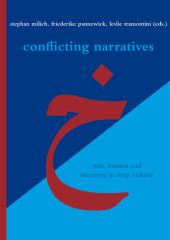 Neuerscheinungen 2012Stand: 2020-01-07 |
Schnellsuche
ISBN/Stichwort/Autor
|
Herderstraße 10
10625 Berlin
Tel.: 030 315 714 16
Fax 030 315 714 14
info@buchspektrum.de |

Stephan Milich, Friederike Pannewick, Leslie Tramontini
(Beteiligte)
Conflicting Narratives: War, Trauma and Memory in Iraqi Culture
Herausgegeben von Milich, Stephan; Pannewick, Friederike; Tramontini, Leslie
2012. 286 p. 24 cm
Verlag/Jahr: REICHERT 2012
ISBN: 3-89500-806-0 (3895008060)
Neue ISBN: 978-3-89500-806-1 (9783895008061)
Preis und Lieferzeit: Bitte klicken
"It is a fitting conclusion to the three critical sections of the volurne, as it suggests a view of the dialectic of home and exile in respect to the theme of translation across languages and the critical potential such an exchange can make to an understanding of the critical and creative work of Iraqi writers. As Pflitsch notes in respect to Fatah´s later novel Onkelehen, for the exiled Iraqi refugee Iraq itself "remains completely alien to him and shows up the limits of his own understanding". It is of course precisely the conflicting cultural horizons of these limits that the volume as a whole situates as a site of research
and creative writing practices."
Von Norman Saadi Nikro
In: De Gruyter, S. 234-237.
-------------------------------------
"It is of couse precisely the conflicting cultural horizons of these limits that the volume as a whole situates as a site of research and creative writing practices."
Von Norman Saadi Nikro
In: OLZ 109, (2014), S.234-237.
This volume deals with the Iraqi cultural production under and after Baathist rule, a research field which, in comparison to Iraqi history and politics, has attracted relatively scant scholarly attention. The contributors depict the impact of dictatorship, sanctions, and successive wars on Iraqi culture, analyze the predominant narratives and counter-narratives in Iraqi culture, as well as considering the effect of the demographic shift to exile and diaspora. Further contributions deal with the fragmentation of Iraq s political culture and artistic representations of diverse identities and historical memories. And last but by no means least, the volume asks how the strategies of those intellectuals who supported and legitimized official politics during the Baathist rule can be approached and studied critically with a view to gaining a better understanding of how official culture functioned.
This volume deals with the Iraqi cultural production under and after Baathist rule, a research field which, in comparison to Iraqi history and politics, has attracted relatively scant scholarly attention. The contributors depict the impact of dictatorship, sanctions, and successive wars on Iraqi culture, analyze the predominant narratives and counter-narratives in Iraqi culture, as well as considering the effect of the demographic shift to exile and diaspora. Further contributions deal with the fragmentation of Iraq´s political culture and artistic representations of diverse identities and historical memories. And last but by no means least, the volume asks how the strategies of those intellectuals who supported and legitimized official politics during the Baathist rule can be approached and studied critically with a view to gaining a better understanding of how official culture functioned.
Stephan Milich studierte von 1997 bis 2003 Islamwissenschaft, Neuere Deutsche Literatur und Erziehungswissenschaft in Freiburg und Kairo. 2004 arbeitete er bei der Gesellschaft zur Förderung der Literatur aus Afrika, Asien und Lateinamerika e. V." (litprom) in Frankfurt und war für die Frankfurter Buchmesse beim Ehrengastauftritt "Arabische Welt" beratend tätig. Von 2005 bis 2008 promovierte er im Fach Islamwissenschaft an der Universität Freiburg zur zeitgenössischen arabischen Exillyrik und unterrichtete am Sprachlehrinstitut der Universität Freiburg Arabisch. In dieser Zeit führten ihn zwei Forschungsaufenthalte nach Palästina, Israel und Jordanien. Von April 2008 bis Oktober 2009 war er als Wissenschaftlicher Mitarbeiter für den Aufbau der Bibliothek des Fachgebiets Arabistik am CNMS (Centrum für Nah- und Mittelost-Studien) in Marburg verantwortlich und unterstützte den Aufbau eines Irakzentrums am CNMS. Seit Oktober 2009 ist er Wissenschaftlicher Mitarbeiter am Göttinger Semi
nar für Arabistik/Islamwissenschaft und forscht weiterhin zu moderner arabischer Lyrik, arabischen Exildiskursen, dem irakischen Roman und arabischer Kinder- und Jugendliteratur. Er verfasste zahlreiche weitere Übersetzungen und literaturwissenschaftlichen Essays in Zeitschriften.


